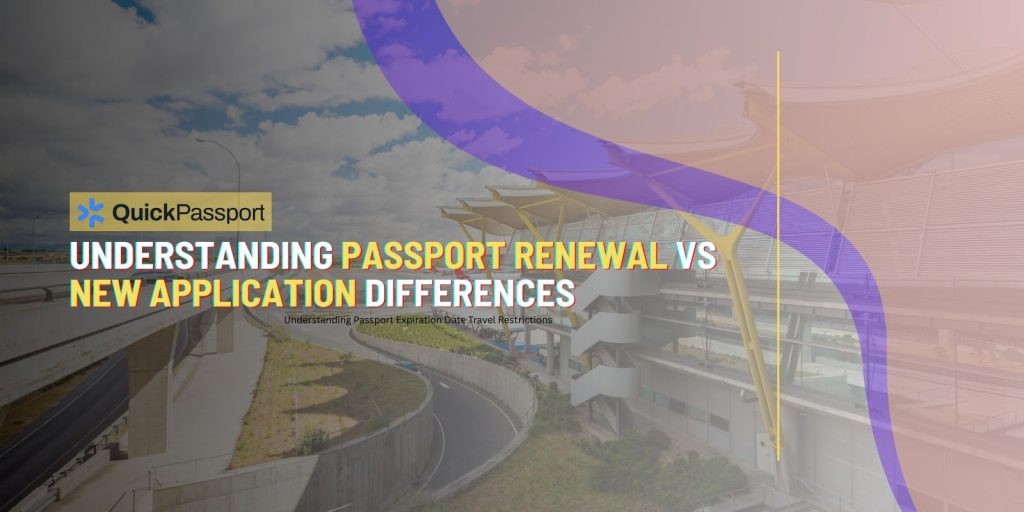Navigating the world of passport applications can feel overwhelming, especially when you’re unsure whether you need a renewal or must start fresh with a new application. The process you choose depends on your specific circumstances, and making the wrong choice can lead to delays, additional fees, and unnecessary frustration. Understanding these critical differences ensures you get your passport efficiently and avoid common pitfalls that cost both time and money.
Overview
This comprehensive guide breaks down the essential differences between passport renewals and new applications, helping Seattle residents make informed decisions about their travel document needs. We’ll explore eligibility requirements, required documentation, processing times, and costs for each option. You’ll discover step-by-step processes, learn about expedited services, and understand when special circumstances require alternative approaches. Our detailed FAQ section addresses the most common questions travelers face, while expert insights help you avoid typical mistakes that delay applications.
Key Takeaways
- Renewal eligibility requires your most recent passport to be undamaged, issued when you were 16 or older, and issued within the last 15 years
- New applications are mandatory for first-time applicants, damaged passports, lost documents, or name changes without proper documentation
- Processing differences include varied timelines, with renewals typically faster than new applications through most channels
- Documentation requirements differ significantly, with renewals needing fewer supporting documents than new applications
- Cost variations exist between renewal fees and new application fees, plus additional charges for expedited processing
- Seattle residents have access to multiple processing options, including QuickPassport Seattle’s specialized services for faster turnaround times
When You Qualify for Passport Renewal
Passport renewal represents the simpler path for eligible applicants, but strict criteria determine whether you qualify for this streamlined process. The U.S. State Department maintains specific requirements that must be met without exception. Your most recent U.S. passport must be physically available, undamaged, and in your possession when applying for renewal.

The age requirement specifies that your previous passport was issued when you were 16 years of age or older. Passports issued to minors under 16 cannot be renewed regardless of their current condition or age. Additionally, your passport must have been issued within the last 15 years from the date you submit your renewal application. Passports older than 15 years automatically require new applications, even if they remain in perfect condition.
Name consistency plays a crucial role in renewal eligibility. You can renew your passport if your current legal name matches the name on your most recent passport exactly. Minor variations in spelling or formatting may still qualify, but significant differences require supporting documentation or potentially a new application process.
Your passport’s physical condition determines renewal eligibility as well. Significant damage includes water damage, torn pages, missing pages, or mutilation that makes information illegible. Normal wear from regular travel typically doesn’t disqualify renewal, but damaged passports often require new applications regardless of other qualifying factors.
Understanding New Passport Applications
New passport applications serve as the comprehensive process for obtaining U.S. passports when renewal isn’t an option. First-time applicants automatically require new applications, regardless of age or circumstances. This process involves more extensive documentation, in-person appearances, and longer processing times compared to renewals.
Lost or stolen passports necessitate new applications, even if they previously qualified for renewal. The State Department treats missing documents as security concerns, requiring applicants to complete Form DS-11 and provide comprehensive supporting documentation. You’ll need to report the loss through appropriate channels and potentially obtain a police report depending on circumstances.
Damaged passport holders must pursue new applications when their documents show significant wear, water damage, or mutilation. Customs officials worldwide scrutinize damaged passports carefully, and many countries refuse entry based on passport condition alone. Damaged documents create travel risks that new applications eliminate entirely.
Name changes without proper supporting documentation typically require new applications. Marriage certificates, divorce decrees, or court-ordered name changes must accompany renewal applications. Missing documentation or complex name change histories often necessitate starting fresh with new applications to avoid processing delays.
Minor applicants under 16 cannot renew passports and must always complete new applications. Parents or legal guardians must provide consent, appear in person with the child, and present additional documentation proving parental relationships and citizenship status.
Documentation Requirements Comparison
The documentation differences between renewals and new applications significantly impact preparation time and complexity. Passport renewals require your most recent passport, a completed DS-82 form, one passport photo, and applicable fees. Supporting documents are generally unnecessary unless you’re changing your name, in which case you’ll need certified copies of legal name change documents.
New applications demand extensive documentation including Form DS-11, proof of U.S. citizenship, government-issued photo identification, one passport photo, and applicable fees. Citizenship proof typically includes certified birth certificates, naturalization certificates, or previous U.S. passports. The State Department maintains strict standards for acceptable citizenship documentation, requiring certified copies rather than photocopies or unofficial documents.
Identification requirements for new applications include valid driver’s licenses, government employee IDs, military IDs, or naturalization certificates. Expired identification documents are generally unacceptable, requiring applicants to update their IDs before passport applications. Alternative identification combinations may work when primary forms are unavailable, but this complexity often extends processing times.
Supporting documentation varies significantly between the two processes. Renewals streamline requirements by relying on your existing passport as primary verification. New applications require independent verification of identity and citizenship, creating more extensive paperwork requirements and potential complications.
Processing Times and Expedited Options
Standard processing times differ between renewals and new applications, though both face seasonal variations and processing volume impacts. Passport renewals through mail typically process within 6 to 8 weeks during normal periods, while new applications often require 10 to 13 weeks for completion. These timeframes represent estimates that can extend during peak travel seasons or staffing challenges.

Expedited processing options exist for both renewal and new applications, reducing standard timeframes significantly. Expedited service typically processes renewals within 2 to 3 weeks and new applications within 7 to 9 weeks. Additional fees apply for expedited processing, and certain restrictions limit availability during high-demand periods.
QuickPassport Seattle offers specialized processing services that can significantly reduce waiting times for both renewals and new applications. Our Priority Service delivers completed passports within 1 to 2 weeks, while our Expedited Service processes applications within 2 to 4 weeks. These services provide alternatives to standard government processing while maintaining full compliance with federal requirements.
Rush processing situations require careful planning and realistic expectations. Same-day or 24-hour passport services advertised by some providers often prove unrealistic or involve significant complications. Seattle residents benefit from QuickPassport’s transparent timelines and reliable processing schedules that accommodate urgent travel needs without unrealistic promises.
Cost Analysis and Fee Structures
Renewal fees generally cost less than new applications, reflecting the streamlined processing requirements. Adult passport renewals cost $130 for the passport book, while passport card renewals cost $30. These fees cover standard processing, with additional charges applying for expedited service or special delivery options.
New application fees include both execution fees and application fees, totaling more than renewal costs. Adult new applications cost $165 total, combining a $130 application fee and $35 execution fee. First-time applicants under 16 pay $135 total, including a $100 application fee and $35 execution fee.
Additional costs can accumulate quickly for both processes. Expedited processing adds $60 to any application, while overnight delivery costs an additional $19.53 for return shipping. Passport photos typically cost $10 to $15 at most locations, though some applicants prefer professional photography for better results.
QuickPassport Seattle provides transparent pricing for our specialized services, eliminating hidden fees and unexpected charges. Our Smart Service processes applications within 4 to 6 weeks, while Priority Service delivers results in 1 to 2 weeks. These services include comprehensive application review, error prevention, and status monitoring throughout the processing period.
Special Circumstances and Exceptions
Emergency travel situations may qualify for limited availability appointments at Regional Passport Agencies. These appointments require proof of international travel within 14 days or 30 days for countries requiring visas. Limited appointment availability makes early planning essential, even for genuine emergencies.
Military deployment creates special considerations for both renewals and new applications. Active duty military personnel deployed overseas may qualify for no-fee passport services, while family members face different requirements. Military postal services can complicate timing, requiring additional planning for document delivery and processing.
Dual citizenship holders face unique challenges when applying for U.S. passports. Previous use of foreign passports for travel may create complications, while some countries restrict dual citizenship entirely. Consular guidance helps navigate complex international requirements and potential conflicts between citizenship obligations.
Legal complications including outstanding warrants, child support obligations, or federal tax liens can prevent passport issuance regardless of renewal eligibility. The State Department coordinates with multiple federal agencies to verify applicant eligibility, potentially delaying or denying applications based on legal status.
Common Mistakes to Avoid

Eligibility misunderstandings represent the most frequent renewal application errors. Applicants often assume damaged passports qualify for renewal or attempt renewals with significantly expired documents. Careful review of eligibility criteria prevents wasted time, returned applications, and additional processing delays.
Documentation errors plague both renewal and new applications, particularly regarding photo requirements and supporting documents. Passport photos must meet strict specifications for size, background color, lighting, and composition. Professional passport photo services typically ensure compliance better than self-taken photos or generic photo services.
Form completion mistakes cause unnecessary delays and potential application returns. Common errors include incomplete information, missing signatures, incorrect fee calculations, or illegible handwriting. Digital form completion reduces many errors while ensuring consistent formatting and completeness.
Timeline miscalculations lead to travel disruptions when applicants underestimate processing requirements. Seasonal variations significantly impact processing times, with spring and summer applications typically taking longer than fall or winter submissions. Starting applications 3 to 4 months before planned travel provides adequate buffer time for unexpected delays.
How QuickPassport Seattle Simplifies Your Process
QuickPassport Seattle specializes in streamlining both renewal and new application processes for Washington state residents. Our experienced team reviews applications for completeness and accuracy before submission, preventing common errors that cause delays or rejections. Professional photo services ensure your passport photos meet all federal requirements while maintaining consistent quality standards.
Application review services catch potential problems before they impact processing times. Our specialists understand common mistakes and documentation issues that frequently delay applications. Expert guidance helps applicants choose between renewal and new application processes based on their specific circumstances and timeline requirements.
Status monitoring keeps applicants informed throughout the processing period. Rather than wondering about application progress, QuickPassport clients receive regular updates and immediate notification of any issues requiring attention. Proactive communication prevents surprises and allows for quick resolution of potential complications.
Seattle-area convenience eliminates travel to distant passport acceptance facilities or Regional Passport Agencies. Our centralized location provides easy access for King County residents while offering flexible appointment scheduling that accommodates busy work and family schedules.
Common Questions About Passport Renewal vs New Application Differences
Can I renew my passport if it was issued when I was 15 years old?
No, passports issued to applicants under 16 years of age cannot be renewed regardless of current age or passport condition. These passports require new applications with full documentation and in-person appearances, even if they remain undamaged and within the 15-year validity window.
What happens if I submit a renewal application when I need a new application?
The State Department will return your renewal application with instructions to complete a new application instead. This delays processing by several weeks and may impact travel plans. Returned applications include refunds of fees paid, but processing time is lost during the review and return process.
Do damaged passports automatically require new applications or can some be renewed?
Minor wear from normal use typically allows renewal, but significant damage requires new applications. Water damage, torn or missing pages, unauthorized markings, or damage affecting personal information or photos necessitate new applications. When in doubt, consult with passport specialists before submitting applications.
Can I change my name during the passport renewal process?
Yes, but only with proper supporting documentation including certified copies of marriage certificates, divorce decrees, or court-ordered name changes. Missing or inadequate name change documentation typically requires new applications instead of renewals, potentially extending processing times significantly.
How do processing times differ between renewal and new applications during peak seasons?
Renewal processing typically remains faster than new applications even during busy periods, but both experience delays during spring and summer months. Peak season renewals may take 10 to 12 weeks compared to normal 6 to 8 weeks, while new applications can extend to 15 to 18 weeks from standard 10 to 13 weeks.
What identification do I need for new applications versus renewals?
Renewals mailed using Form DS-82 don’t require additional identification beyond your previous passport. New applications require government-issued photo identification such as driver’s licenses, state IDs, military IDs, or government employee credentials. Expired identification is generally unacceptable for new applications.
Are there different photo requirements for renewals versus new applications?
Photo requirements remain identical for both processes, following strict State Department specifications for size, composition, background, and quality. Recent photos taken within six months showing current appearance are required regardless of application type, even if your previous passport photo remains accurate.
Can military personnel use different processes for passport applications?
Active duty military personnel deployed overseas may qualify for no-fee passport services and alternative application procedures. However, eligibility criteria for renewal versus new applications remain the same regardless of military status. Deployed personnel should consult with military postal services for specific submission procedures.
How do expedited services work differently for renewals versus new applications?
Both renewals and new applications can request expedited processing for additional fees, but processing times differ. Expedited renewals typically complete within 2 to 3 weeks, while expedited new applications require 7 to 9 weeks. Priority services through specialized providers like QuickPassport Seattle offer faster alternatives for both application types.
What should I do if I’m unsure whether I qualify for renewal or need a new application?
Consult with passport specialists who can review your specific circumstances and documentation. QuickPassport Seattle offers free consultations to determine eligibility and recommend appropriate application processes. Professional review prevents costly mistakes and ensures efficient processing based on individual situations.
Making the Right Choice for Your Travel Needs
Understanding the differences between passport renewals and new applications empowers you to make informed decisions that save time, money, and frustration. Careful evaluation of your eligibility, timeline requirements, and documentation availability helps determine the most efficient path forward. Seattle residents benefit from professional guidance and specialized services that streamline both processes while ensuring compliance with federal requirements.QuickPassport Seattle stands ready to assist with expert consultation, application review, and expedited processing services tailored to your specific needs. Our comprehensive approach eliminates common mistakes while providing reliable timelines that accommodate urgent travel requirements. Contact our experienced team today to discover how we can simplify your passport application process and ensure your travel documents arrive when you need them most.






